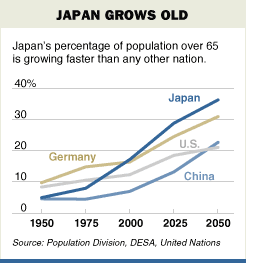This past Sunday, the New York Times had an opinion piece title, “Without Babies, Can Japan Survive” by Alexandra Harney. The article discusses the problems facing Japan’s aging  population and what kind of future Japan could have (assuming the current trends continue).
population and what kind of future Japan could have (assuming the current trends continue).
Here are some alarming facts about Japan (gleamed from the article):
- The first grade class at the elementary school in Nanmoku, about 85 miles from Tokyo, has just a single student this year. The local school system that five decades ago taught 1,250 elementary school children is now educating just 37.
- Over the next 25 years, the proportion of Japan’s population that is elderly will rise from almost one in four to one in three.
- Sales of adult diapers will soon surpass those of baby diapers.
The problem isn’t as simple as having more babies (which would take a generation before the population imbalances would be address). There are systematic issues with the Japanese government’s policies and with the way companies in Japan run their businesses. The quickest fix would be (of course) to bring in people from other countries, but that is not a very popular idea to many Japanese.
This article spoke to me for another reason. Being Japanese American, my wife and I have discussed whether or not we should even teach our child Japanese. We wondered the wisdom of teaching him a language of country that (at this point) doesn’t seem to have a future. We wondered if it would be wiser to teach him Spanish.
Consider this: They are saying that by 2018 (assuming present trends continue), there will be more imports from Mexico than from China (The Economist) and that the world’s energy supply will shift from the Middle East to the Americas. (Foreign Policy)
Purely on a “what’s best for the future of my child and what will give him the best chance of professional success (in any field he chooses),” it makes sense for him to know Spanish. I don’t need to even mention the fact that the Latino population in America is increasing and will make him more marketable domestically as well.
If not Spanish, then I should teach him Chinese. I don’t think there is a person out there who doesn’t believe China is going to play a major role on the global stage — both economically and politically — for the next one hundred years.
And yet I hesitate.
My child should learn Japanese, right? It’ll connect him to his “people” (whatever that means). It’ll give him a sense of where his ancestors came from and possibly pride.
And yet that doesn’t ring true either.
I’ve only been to Japan once since becoming adult and rarely hear Japanese being spoken (other than from my mother). Besides I consider myself more Asian American than Japanese. I share more in common with other Asian Americans than I do with people from Japan. That feeling will only intensify considering that both my wife and I were born and raised in the United States.
So what should I do? I don’t have an answer and I don’t presume to tell anyone what they should or shouldn’t do. It’s one of those parental dilemmas with no clear right or wrong answer. But my question to you is this, after reading the article about Japan (and it’s murky future) and knowing my situation, what would you do?








